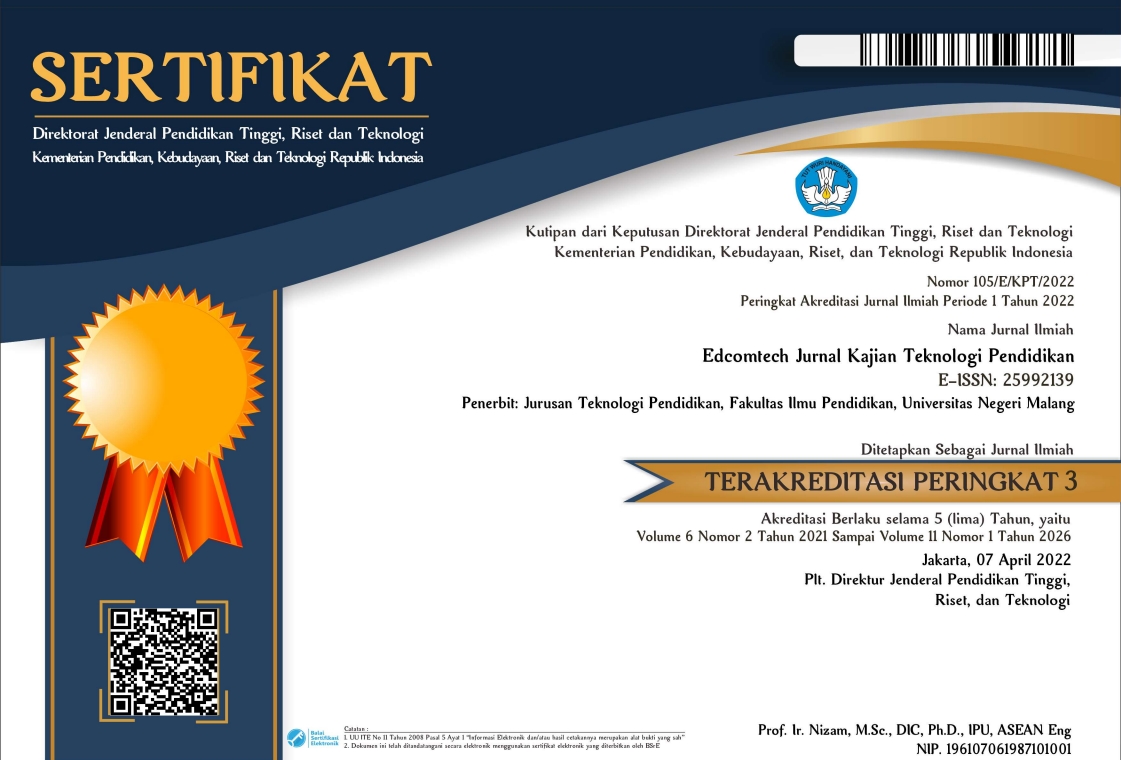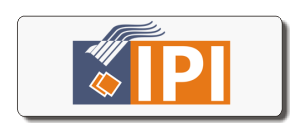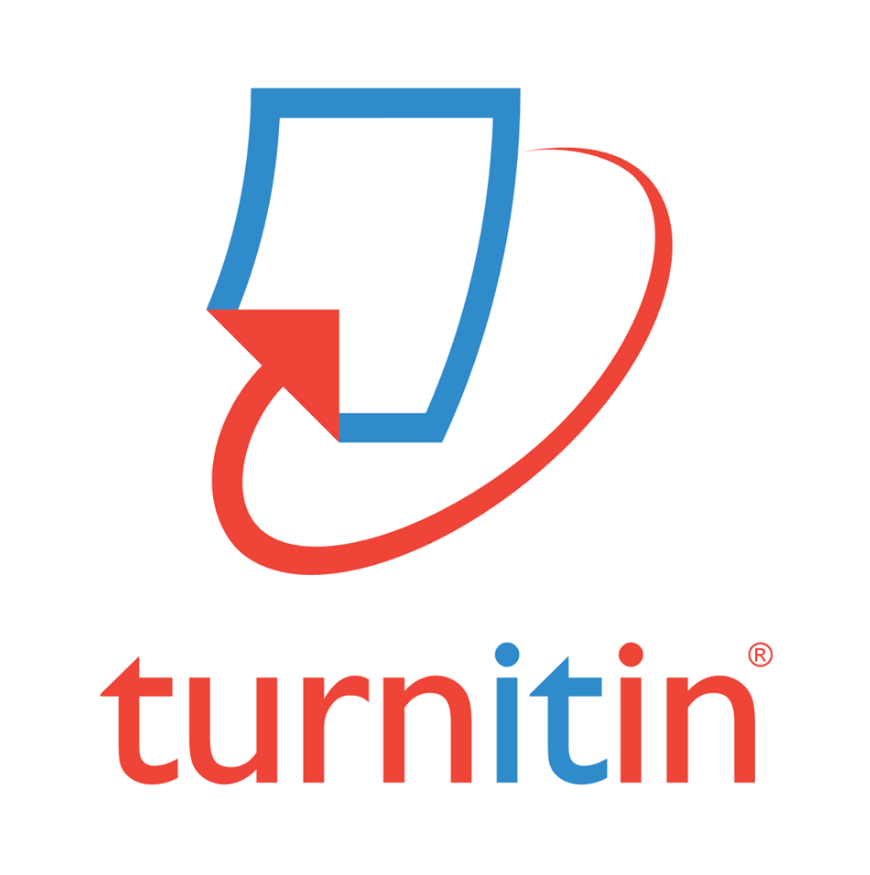Kajian Pemanfaatan Fitur dan Fasilitas Moodle dan Office-365 untuk Peningkatan Kualitas Pembelajaran pada Tutorial Online
Abstract
Abstrak: E-learning merupakan singkatan dari electronic learning, merupakan cara baru dalam proses belajar mengajar yang menggunakan media elektronik khususnya internet sebagai sistem pembelajarannya Universitas Terbuka (UT) memiliki aplikasi e-learning yang di beri nama Tuton (tutorial online) Sistem pembelajaran jarak jauh yang di gunakan UT sekarang sangat membantu dosen dan mahasiswa dalam proses belajar dengan memanfaatkan teknologi yang sudah maju seperti sekarang ini. Pada studi ini, kami mencoba menganalisis persepsi mahasiswa dan tutor dalam pemanfaatan fitur dan fasilitas Office 365 dalam tuton dan praktek online. Berdasarkan hasil pembahasan diperoleh kesimpulan bahwa Tanggapan terhadap perlu tidaknya fitur dipengaruhi oleh usia, gender, pendidikan, pelatihan tuton, dan aktivitas tuton. Kecuali pada fasilitas konferensi online dan berbagi cerita digital, tanggapan terhadap perlu tidaknya fasilitas dipengaruhi usia, gender, pendidikan, pekerjaan, pelatihan dan atau aktivitas tuton. Oleh karena itu, rekomendasi yang kami ajukan adalah diperlukan adanya kegiatan yang dirancang untuk mencapai optimalisasi pembelajaran jarak jauh antara lain penguatan lingkungan tuton dan prakton, perlunya peningkatan kompetensi TIK staf akademik dan keterlibatannya dalam tuton/prakton, perlunya peningkatan kapasitas pelayanan prima kepada semua pemangku kepentingan UT dan pengembangan dan peningkatan pelatihan penggunaan aplikasi standar dalam Moodle dan Office365 agar bisa saling melengkapi.
Abstract: One of the main means to enhance student’s learning activities is by implementing technology in their learning activities. Nowadays, many universities in the world had applied this method due to many benefits that its offer. Universitas Terbuka (UT) is one of distance learning institution in Indonesia that had applied this method for its student. Therefore, this research intends to investigate the perceptions of students and tutors in utilizing the features and facilities of Office365 in online tutorial and online practicum. Furthermore, the perceptions of students and tutors that was analyzed include the use of standard applications contained in Moodle and their expectations in utilizing Office365 features and facilities for online tutorials and online practicum. This study employs online survey that consists of 11 items. The perception of student regarding the Office365 features is influenced by age, gender, education, online tutorial training, and online tutorial activities. The students’ responses of Office365 facilities are affected by age, gender, education, employment, training and online tutorial activities. Office365’s features and facilities are most likely to influence the effectiveness of the distance learning process since students have the opportunity to interact with their teachers, peers, and learning materials. Moreover, the Office365 enable student to access the material through this facility. The other benefit is the existence of forum that could be used as discussions means between student and lecturer. Hence we recommend that all online activities should be designed to achieve the optimization of distance learning such as strengthening the online tutorial and online practicum, improving the ICT competence of academic staff and their involvement in online tutorial and online practicum, improving services to all UT’s stakeholders and developing an upgrade of standard application training of Moodle and Office365
Keywords
Full Text:
PDFReferences
Bates, T., & Sangra, A. (2011). Managing technology in higher education: Strategies for transforming teaching and learning. San Francisco: Jossey-Bass.
Brady, K. P., Holcomb, L. B., & Smith, B. V. (2010). Journal of Interactive Online Learning, 9(2), 151.
Cavus, N. (2013). Selecting a learning management system (LMS) in developing countries: instructors' evaluation. Interactive Learning Environments, 21(5), 419-437. doi:10.1080/10494820.2011.584321
Chung, C., & Ackerman, D. (2015). Student Reactions to Classroom Management Technology: Learning Styles and Attitudes Toward Moodle. Journal of Education for Business, 90(4), 217-223. doi:10.1080/08832323.2015.1019818
Desnica, E., Letic, D., & Navalusic, S. (2010). Techniques Technologies Education Management–TTEM, 5(2), 378.
Kudumovic, M., Kudumovic, D., Mesanovic, N., & Huremovic, E. (2010). HealthMED, 4(null), 158.
Lu, J., & Law, N. W. Y. (2012). Understanding collaborative learning behavior from Moodle log data. Interactive Learning Environments, 20(5), 451-466. doi:10.1080/10494820.2010.529817
Moore, M. (2013). The Handbook of Distance Education. 3rd edition.
Petrovic, N., Jeremic, V., Cirovic, M., Radojicic, Z., & Milenkovic, N. (2014). Facebook Versus Moodle in Practice. American Journal of Distance Education, 28(2), 117-125. doi:10.1080/08923647.2014.896581
Smith, B. V. (2009). Use of online educational social networking in a school environment (Vol. null).
Refbacks
- There are currently no refbacks.
Copyright (c) 2018 Adhi Susilo, Deddy Ahmad Suhardi

This work is licensed under a Creative Commons Attribution-ShareAlike 4.0 International License.
Edcomtech: Jurnal Kajian Teknologi Pendidikan published by Department of Educational Technology, Faculty of Education, State University of Malang in Collaboration with Asosiasi Program Studi Teknologi Pendidikan Indonesia (APS TPI) and Ikatan Profesi Teknologi Pendidikan Indonesia (IPTPI) with MoU.
Publisher Address:
Lab. Teknologi Pendidikan, Gd.E2, Lt.1
Fakultas Ilmu Pendidikan Universitas Negeri Malang
Jalan Semarang No 5, Kota Malang Kode Pos 65145
Email: edcomtech.fip@um.ac.id
========================================================================================================
| INDEXED BY | TOOLS | PLAGIARISM CHECK | ARTICLE TEMPLATE |
|

Edcomtech is licensed under a Creative Commons Attribution-ShareAlike 4.0 International License.
Edcomtech Statistics (Since July 13th, 2020)












1.png)








